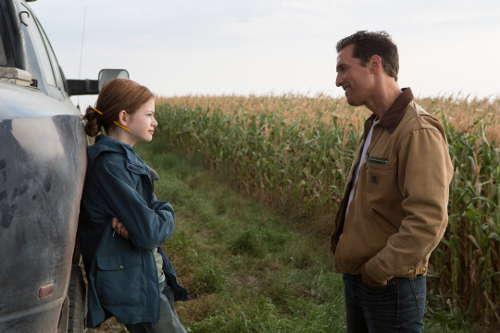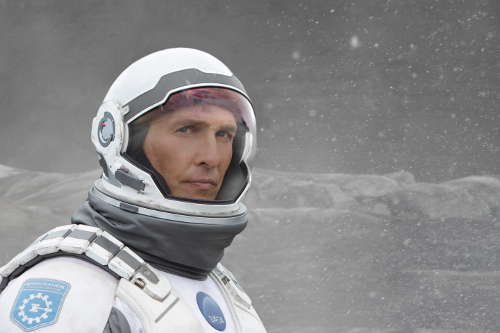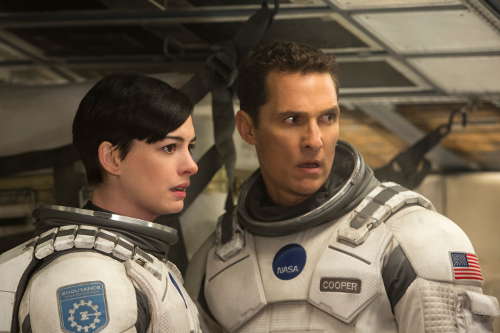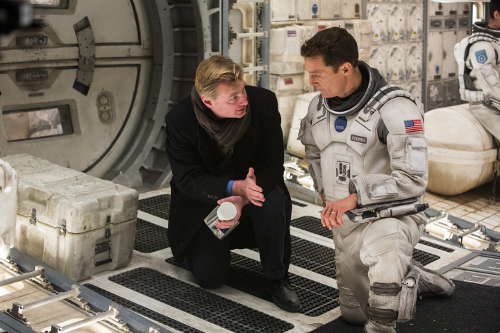Movie Review: Interstellar (2014)
Maybe I was too young when I first saw 2001: A Space Odyssey and couldn’t understand it. Despite its grandeur, it left me a little cold. Even after multiple re-watches in later years, at least one of which in glorious 70mm. It’s obviously a towering achievement, but I’ve never felt overly engaged by the stiffness of its main cast nor completely swept up in its cold tale of humanity’s place in the stars.
Interstellar very clearly sets out its stand as “2001 with heart”, attempting to mesh the exploration of infinite space with the desperation of a father who wants nothing more to return to his family. While it mostly succeeds, it’s sure to split audiences thanks to the unreasonable expectations placed upon the next film from “The Maker of the Dark Knight Trilogy and Inception“.
Interstellar posits a future where humanity has given up on the stars, where only old men remember a time when there were six billion people on the planet and attempting to keep the reduced population fed is mankind’s primary concern. Mother Earth no longer sustains humanity. Wheat is extinct. The current failing crop of okra will be the last crop of okra ever, thanks to a blight and no one can mount a grand mission to save us. The tools to do so having been dismantled long ago to help the starving. Even MRI’s are scarce.

Thanks to spoilery reasons, ex-test pilot Matthew McConaghey’s Cooper, farmer, father of two kids and man born either “40 years too early or 40 years too late”, becomes involved in a last gasp chance to find a safe place for humanity in parts unknown via a mysterious stable wormhole near Saturn. Once there, he’ll need to go beyond the infinite to find a new refuge for humanity amongst the stars.
Along its journey through space and time, the film touches on themes of love, the morality of hiding a terrible truth for the greater good, the lonely madness to be encountered in the face of desperation, true sacrifice, the risks that can not only be considered but embraced after for ideas bigger than ourselves and, most of all, that no matter where we go in the universe, ultimately we will always bring who and what we are with us – our hopes, our fears, our loves, our biggest strengths and our greatest weaknesses.
While Nolan takes a long time on planet Earth before reaching for the stars, it’s wholly necessary to ensure that the audience understands the human cost of attempting to travel such immense distances. It has elements of 2001 (obviously), but also Sunshine, Contact and Prometheus, but remixes them into a more emotional/satisfying whole. I love each of these films, but they each have their flaws/foibles, as does Interstellar. At times, this can veer towards pastiche, but when Nolan with (the able assistance of Zimmer as well as his top notch cast) arranges the elements correctly, it really can pack an emotional wallop.
Every risk taken on the crew’s journey is felt through the creaks and groans of their not quite state-of-the-art Ranger spacecraft, etched in the cast’s faces as they strain to survive, and embedded in every note of Zimmer’s soaring score.

Back to that “spoilery reason” for Cooper’s involvement mentioned above: there is another element to the film that has mostly been left out of publicity materials that may, initially, seem like destiny taking a hand in proceedings, but most science fiction fans will probably spot where this is going almost immediately. Most of them will be correct. This doesn’t detract from the film, but does add the feeling of a big budget Outer Limits episode. It just goes to show that with the proliferation of media and ideas, it is much harder to come up with a truly new, staggering plot twist for your movie these days.
The journey itself is the key here, and in this, Nolan has crafted a tense thrill ride which really highlights the majesty and immensity of space. While the planets they reach have awe inspiring features, it does slightly feel like they were designed around being achievable, for the most part, with as few effects as possible to leave more budget for the vistas and admittedly impressive action sequences.
While the crew of the Endurance have an idea of what’s on the other side, once through the wormhole, Cooper and his team of Hathaway, Wes Bentley and David Gyasi are completely on their own, able to receive messages from home, but unable to respond. Every moment not spent standing around talking is filled with tension. Anything could go wrong at any moment: from shuttle crashes to unexpected planetary phenomena to the unusual effects around black holes. The crew have a number of planets to evaluate as humanity’s new home and not all of them are hospitable, nor immediately inhospitable.

As usual Zimmer helps ratchet up the tension even further with his score, soaring and swooping as the current obstacle is surmounted or failure comes to pass. Many will end up nervously tapping their foot for much of the second half of the movie thanks to his efforts.
As for the cast, as usual, McConaughey’s easy charm and obvious pain from parting on bad terms with his daughter, Murph, make him a likeable lead. All the leads turn in good performances. It’s always good to see Lithgow and Caine on screen. Hathaway is an able foil for McConaughey, but is saddled with a ham-fisted speech in the third act that reminds audiences of the main theme of the movie, for anyone who hasn’t been paying attention, before its final reveal later, which does detract somewhat from the film. Matt Damon also does ok work with a pretty thankless and very spoilery role late in the film. Jessica Chastain also provides sterling work in her, yet again spoilery, role.
The real stars of the show here are the CASE and TARS, those odd looking monolithic robots as seen in the most recent trailers. The Nolan brothers and their effects crew have, apparently, effortlessly imbued a block of metal with the most humanity in the movie. These old robot marines, once the peak of technology, are now just antiques, act as protectors, co-pilots and support staff for their human crew and inject some welcome humour into the mix by discussing their flying style with Coop and debating their current humour and honesty settings.

While the ending blatantly shares some elements with 2001, Interstellar is a lot more straightforward. It’s highly doubtful film students will be discussing its meaning next year, never mind in 20 years time. It’s a lot more clear what’s going on and the very final sequences of the film, while inspiring, does lack a little visual punch. The final inspirational notes of the film fall a little flat when the images accompanying them are relatively pedestrian, compared to what has gone before. A minor niggle, but it does slightly spoil the inspirational message of the film.
After Inception and the Dark Knight Trilogy, the expectation for this film is huge. Interstellar never had a chance to have the cultural impact that 2001 had in its day, but it’s a very enjoyable, engaging science adventure. It’s not going to change the world, but it may inspire future generations to do so, and not just by travelling out there, but also taking care of business right here in our back yard.
Check Out Our Other Review For Interstellar:
Benjamin Pineros
